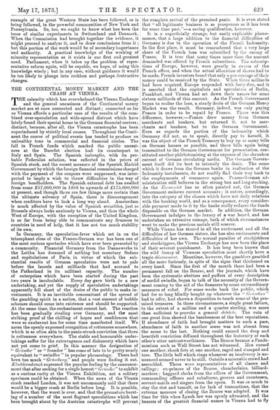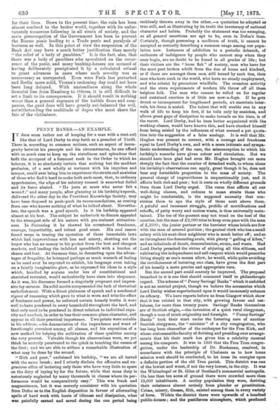THE CONTINENTAL MONEY MARKET AND THE CRASH AT VIENNA.
THE calamity which has overwhelmed the Vienna Exchange and the general uneasiness of the Continental money market are at once connected and distinct ; connected so far as Vienna affords a particular case of the results of the com- bined over-speculation and wide-spread distrust which have lately found their special home in the German financial centres ; distinct, because, after all, the Vienna catastrophe has been superinduced by strictly local causes. Throughout the Conti- nent the course of political events has tended to produce an unhealthy tone in commercial and financial circles. The fall in French funds which marked the public uneasi- ness at the Barodet election had its counterpart in Italy and Spain. The Spanish imbroglio, with its pro- bable Federalist solution, was reflected in the prices of Spanish stock, and the recent measure of the Spanish Madrid Government by which the foreign financial commissions charged with the payment of the coupons were suppressed, was inter- preted to imply a wish to throw difficulties in the way of foreign bondholders. The Spanish external debt has swelled from some £57,000,000 in 1868 to upwards of £175,000,000 at present, and though there are few things more certain than the ultimate solvency of Spain, there is discouragement when creditors have to look a long way ahead. Amsterdam is much affected by the value of Spanish securities, just as Brussels always looks anxiously to Vienna, and thus the whole West of Europe, with the exception of the United Kingdom, is so far from being able to communicate any firmness to countries in need of help, that it has not too much stability of its own.
In Germany, the speculation-fever which set in on the triumphant close of the Franco-German war has been one of the most curious spectacles which have ever been presented by a community. Financial Germany from the Dannewerke to the Leitha has dreamed of nothing but monetary Sedans and capitulations of Paris, in virtue of which the sub- stantial results of German speculation were not to pale before the laurels and milliards that had accrued to the Fatherland in its militant capacity. The number of enterprises which have been started during the past two years is incalculable. Every day gave birth to a new undertaking, and yet the supply of speculative undertakings apparently fell short of the desire of the public to make in- vestments. It is an inevitable concomitant of the spread of the gambling spirit in a nation, that a vast amount of bubble schemes should come into existence and should be supported. At the same time, the enchantment cannot last. The reaction has been gradually stealing over Germany, and the most striking proof of the chilling of hopes and confidences that were so exuberant has for some time manifested itself. We mean the openly expressed recognition of rottenness somewhere, which is so often akin to the panic-struck conviction that there is rottenness everywhere. The stable and honourable under- takings suffer for the extravagance and dishonesty which have not yet come to grief. In this manner the designation of " Grander " or " founder " has come of late to be pretty nearly equivalent to " swindler " in popular phraseology. There had been too much "Grand/mg," and people were finding it out. Kladderadatsch expressed the popular feeling by the announce- ment that after seeking for a single honest " Grande)." to exhibit as a curious rarity at the Vienna Exhibition, not a solitary specimen could be obtained. When the news of the Vienna crash reached London, it was not uncommonly said that there would be a bigger crash at Berlin before long. It is possible, however, that the worst is over, and that the premature burst- ing of a number of the most flagrant speculations which has been brought about by the Austrian catastrophe will prevent the complete arrival of the promised panic. It is even stated that " all legitimate business is as prosperous as it has been for some time past,"—a saving qualification, however.
It is a superficially strange, but easily explicable pheno- menon, that a large addition to the financial difficulties of Germany is due to the operation of the French Indemnity. In the first place, it must be remembered that a very large share of the French loan was subscribed by the enemy of France. It is true that many times more than the amount demanded was offered by French subscribers. The subscrip- tions of Europe, however, were greatly in excess of the French offers, and when the actual allocation of shares had to be made, French investors found that only a per-tentage of their money could be received by the State. When three milliards had been required, Europe responded with forty-five, and it is asserted that the capitalists and speculators of Berlin, Frankfort, and Vienna had set down their names for some sixteen milliards of this amount. As the French Government began to realise the loan, a steady drain of the German Money Market was the result. Germany, indeed, was only paying France in order to be repaid by France. There was this difference, however,—France drew money from German merchants and bankers, but returned it, not to mer- chants and bankers, but to the German Government. Even as regards the portion of the indemnity which Germany did not, so to speak, directly pay to herself, it was the object of the French Treasury to buy up as many bills on German houses as possible, and these bills again being transmitted to the German Government for presentation, con- stituted another phlebotomising at the expense of the shrunken current of German circulating media. The German Govern- ment itself did its best to intensify the drain. The sums which it draws from the German banks in realisation of the Indemnity instalments, do not readily find their way back to the employments of commerce again. Prusso-German ad- ministration still believes in the strong box and long stocking. As the L'eunonii4 has so often pointed out, the German Government eschews current accounts ; it enters, accordingly, into the category of the classes which have not daily relations with the banking world, and as a consequence, every consider- able payment made to it by the banks really reduces the funds disposable on the German market. In addition, the German Government indulges in the luxury of a war hoard, and has undertaken an extensive coinage, both of which circumstances went to make the precious metals still scarcer.
While Vienna has shared in all the excitement and all the difficulties of her German sisters, she has also excitements and difficulties of her own. The normal paradise of stockjobbers and atockriggers, the Vienna Exchange has now been the place of their severest punishment. It has long been known that the wild frenzy of Viennese speculation must shortly have a tragic deitottement. Meantime, however, the gamblers gambled all the more furiously, in spite of the signs that thickened on every hand. Since the first of the month there had been a permanent fall on the Bourse, and the journals, which have been the systematic abettors and puffers of every description of sordid swindle, began to talk of the necessity of the Govern- ment coming to the aid of the financers by some extraordinary measures of relief. For some weeks back the public, which had for so long blindly bought up whatever the cc Griitulers" had to offer, had shown a disposition to touch some of the pro- mised treasures. In these circumstances, a single great failure, to the extent of a million and a quarter sterling, was more than sufficient to provoke a general debacle. The ruin of one great firm showed the baselessness of the best reputations. If abundance of faith had brought matters to such a pass, abundance of faith in another sense was not absent from the scene to the last. Nothing could exceed the deep and heartfelt conviction diffused throughout the fraternity of each other's utter untrustworthiness. The Bourse became a Pande- monium such as Wall Street has not witnessed. Men cursed one another, shook fists at one another, raged and stamped and tore. The little bell which rings whenever an insolvency is an- nounced seemed never to be still. Outside a miserable crowd had assembled. There were representatives of all classes and callings ; ex-princes of the Bourse, chamberlains, billiard- markers ; haggard clerks from the offices of the Government, commanding officers and subalterns, grocers and countesses, servant-maids and singers from the opera. It was as much to stay the riot and tumult, as for lack of transactions, that the extreme measure of closing the Bourse was adopted. It was time for this when Lynch law was openly advocated, and the bearers of the greatest financial names in Vienna had to fly for their lives. Down to the present time, the ruin has been almost confined to the broker world, together with its unfor- tunately numerous following in all strata of society, and the main preoccupation of the Government has been to prevent the Bourse panic leading to a Trade panic and paralysis of business as well. In this point of view the suspension. of the Bank Act may have a much better justification than merely " the relief of a body of gamblers." It is the fact, also, that there was a body of gamblers who speculated on the occur- rence of the panic, and many banking-houses are accused of having deliberately precipitated it by a calculated refusal to grant advances in cases where such severity was as unnecessary as unexpected. Even were Paris less perturbed and Berlin more solid, Vienna's reckoning day could not have been long delayed. With unsteadiness along the whole financial line from Hamburg to Odessa, it is still difficult to set a limit to its consequences. If it should result in nothing worse' than a general exposure of the bubble firms and com- panies, the good done will have greatly out-balanced the evil, notwithstanding the multitude of dupes who must share the fate of the victimisers.



































 Previous page
Previous page